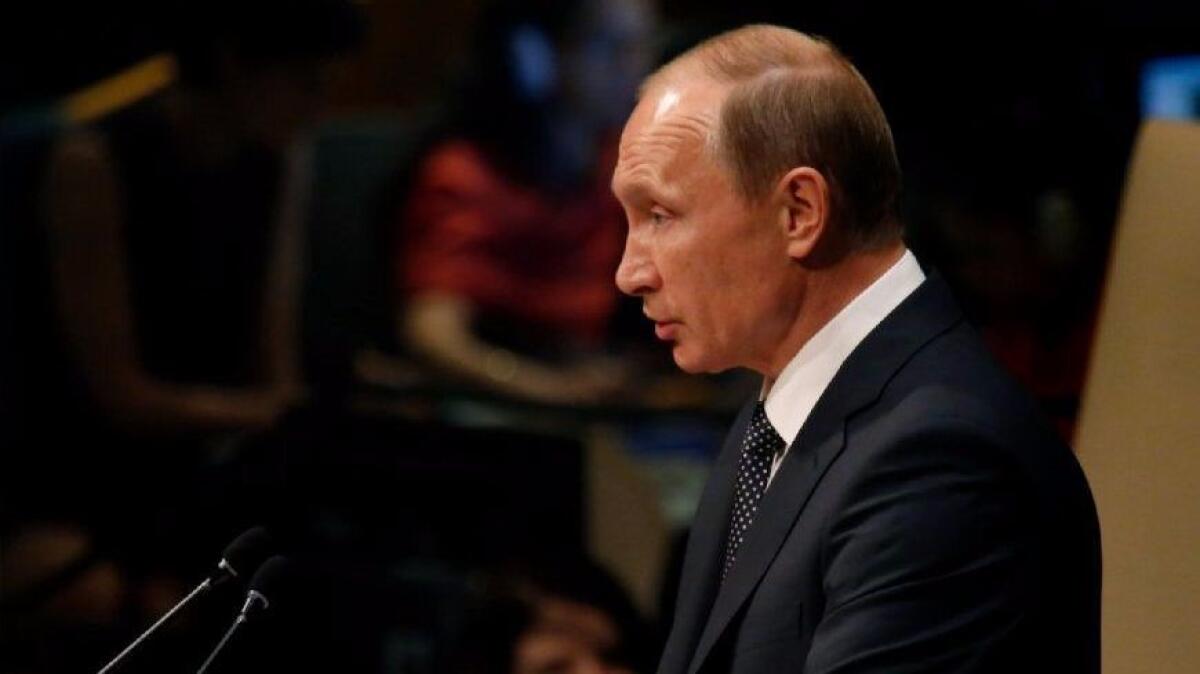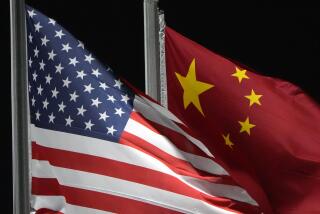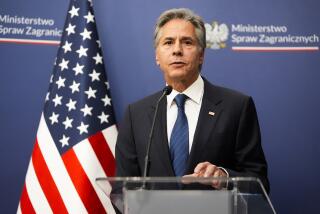Moscow decries ‘hostility’ as Trump moves toward new Russia sanctions

Reporting from Washington — The Russian government on Friday accused the United States of displaying “hostility” as the Trump administration belatedly took the first steps toward imposing new sanctions to punish Moscow for interfering in the 2016 presidential election.
In early August, after considerable delay and with minimal fanfare, President Trump signed into law a measure that required the new sanctions, which target individuals and firms with ties to Russian defense and intelligence agencies.
Under the law, companies that “knowingly engage in a significant transaction” with people or firms on the list could be subject to U.S. sanctions after Jan. 28.
The law gave the administration until Oct. 1 to produce a list, and the administration has been under mounting pressure from Congress to do so after it missed that deadline. Late Thursday, Secretary of State Rex Tillerson authorized officials to release the list to key members of Congress.
On Friday, Dmitry Peskov, the spokesman for Russian President Vladimir Putin, told reporters on a conference call that the new sanctions had “echoes of hostility” in them.
“These are echoes of unfriendly signs, to be precise, even hostility against our country,” Peskov said.
The exchange provided further evidence of the deteriorated state of relations between Russia and the United States. Despite initial celebrations in Russian political circles after Trump’s election, the Kremlin has been disappointed by the lack of improvement in Moscow-Washington relations.
Peskov pointed the finger at Washington for not doing its part, saying that while Russia was ready for better ties, Washington seemed “not so steady.”
“However, we will be patient and continue to be committed to a constructive approach,” he added.
The sanctions list, which has not been made public, covers more than two dozen Russian defense industry companies, including the Kalashnikov Group, the maker of the AK-47 automatic rifle.
Igor Pshenichnikov, an expert at the Russian Institute for Strategic Studies, told the Russian news agency TASS that the inclusion of so many defense industry companies indicated that the U.S. was “making every possible effort to take over the global arms market.”
“It is an example of unfair and obnoxious competition,” Pshenichnikov said.
Implementing the new sanctions could present complicated issues. Turkey, a NATO ally, plans to buy an anti-aircraft defense system from Russia. Saudi Arabia has been negotiating a similar purchase. Such purchases could potentially put both countries at risk of violating the new rules.
In a recent interview with CNN, Tillerson said that State and Treasury department officials were working on detailed guidance for how the new sanctions would work.
“We are being very careful,” he said, “because there are business entities that need guidance; there are important allies and partners in NATO, other parts of the world, who need specific guidance so that they do not run afoul of the sanctions act.”
“We have every intention of implementing Congress’ intent,” he added.
In a joint statement, Sens. John McCain (R-Ariz.) and Ben Cardin (D-Md.), who have been among the leaders in Congress on the sanctions issue, praised the administration for taking a first step but warned that recent cutbacks at the State Department could hamper the sanctions.
The State Department needs to “dedicate robust staffing and resources to the implementation effort,” they said, noting that Tillerson has downgraded the department’s sanctions office and “a number of its staff have resigned.”
Whether the administration’s delay in moving ahead on the new sanctions stems from under staffing at the State Department, bureaucratic inertia or some deeper aversion by Trump to any steps against Moscow has been the subject of much discussion in Washington.
“I think that the Trump administration is slow when it comes to Russia,” Sen. Lindsey Graham (R-S.C.) said Sunday on NBC’s “Meet the Press” in response to a question about the delay.
“They have a blind spot on Russia I still can’t figure out,” he added.
Times staff writer Lauter reported from Washington and special correspondent Ayres from Moscow.
For more on Politics and Policy, follow me @DavidLauter
ALSO
Narrow House passage of GOP budget resolution suggests tax reform plan faces a tough road
Catalonia declares its independence from Spain, setting the region on a collision course with Madrid
Get the latest news from the nation’s capital on Essential Washington >>
More to Read
Get the L.A. Times Politics newsletter
Deeply reported insights into legislation, politics and policy from Sacramento, Washington and beyond. In your inbox three times per week.
You may occasionally receive promotional content from the Los Angeles Times.











